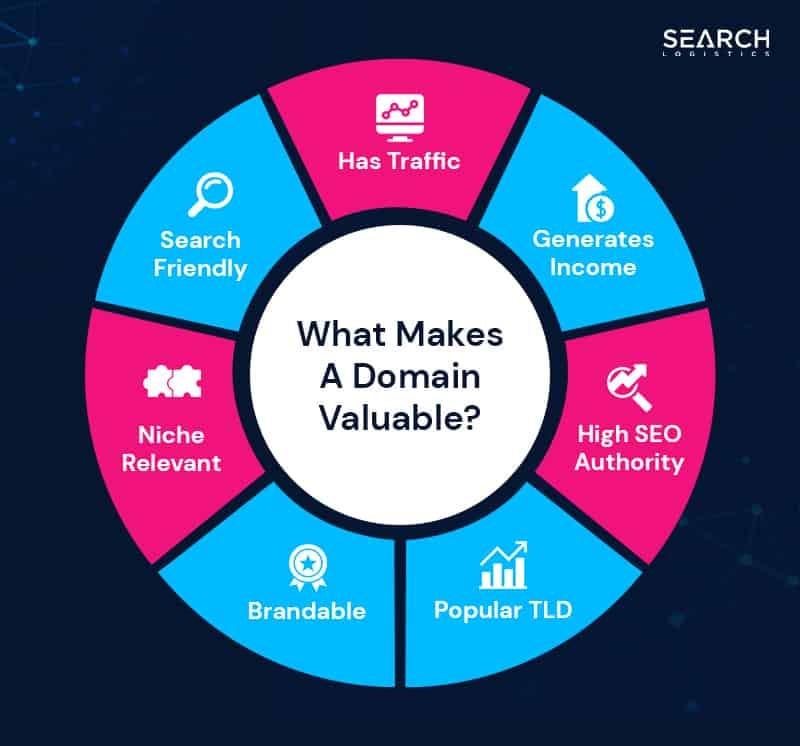Table of Contents
- Understanding the Domain Flipping Market and Its Potential
- Essential Criteria for Choosing Profitable Domains
- Strategies for Effectively Purchasing and Selling Domains
- Marketing Techniques to Enhance Domain Visibility and Value
- Common Pitfalls in Domain Flipping and How to Avoid Them
- Q&A
- Concluding Remarks
Understanding the Domain Flipping Market and Its Potential
The domain flipping market has gained significant traction in recent years, offering investors and entrepreneurs a unique opportunity to capitalize on digital real estate. With the growing online presence of businesses and individuals alike, the demand for quality domain names has surged. Flipping domains involves purchasing an undervalued domain name, enhancing its value through various strategies, and then selling it at a profit. This process can prove lucrative, especially if one knows how to navigate this vibrant market.
To truly excel in domain flipping, it’s essential to understand the key factors that drive a domain’s value. A few critical aspects include:
- Domain Age: Older domains often have established authority and backlinks, making them more attractive to buyers.
- Keyword Relevance: Domains containing popular keywords can rank better on search engines, increasing their desirability.
- Brandability: A catchy and memorable domain name can significantly influence a buyer’s interest.
To maximize your potential in this competitive landscape, consider leveraging market trends and conducting thorough research. Utilize tools to identify upcoming trends and popular keywords that can influence future buying behavior. Another strategy is to network within the domain flipping community. By joining forums and online groups, you can gain insights from seasoned flippers and potential collaborators. Understanding the market dynamics and continuously adapting your strategy are vital for long-term success in domain flipping.


Essential Criteria for Choosing Profitable Domains
When diving into the world of domain flipping, the selection of a profitable domain is crucial. Begin with a focus on keywords that hold high search volume and low competition. Tools like Google Keyword Planner or Ahrefs can assist in identifying these valuable terms. Ideally, your domain should incorporate relevant keywords that reflect a specific niche or industry, boosting discoverability. Additionally, domains that are easy to spell and pronounce are more likely to stick in potential buyers’ minds, ultimately driving traffic.
Aged domains can carry significant value, often ranking higher due to their established history. Look for domains that have been around for a few years, ideally with a clean backlink profile. This not only enhances their authority but also contributes to trustworthiness within search engines. Moreover, check for expired domains that previously had significant traffic. Resources like Archive.org can give insight into the site’s past content and visitor statistics, helping you make informed decisions.
Lastly, consider domain extension and length. Although .com domains are widely recognized and often preferred, alternatives like .net, .org, or niche-specific extensions can still yield profitability when paired with the right content and marketing strategies. Aim for domains that are under 15 characters to ensure ease of use and memorability. Below is a simple comparison of popular domain extensions:
| Domain Extension | Common Usage | Pros | Cons |
|---|---|---|---|
| .com | Commercial entities | Highly familiar, trusted | Higher competition |
| .net | Networks, tech | Good for tech-related sites | Less recognition than .com |
| .org | Non-profits, community | Perceived as trustworthy | Can be misinterpreted |
| .io | Startups, tech | Popular among tech companies | Higher cost |


Strategies for Effectively Purchasing and Selling Domains
When venturing into domain flipping, having a clear strategy for both purchasing and selling domains is crucial. First and foremost, conduct thorough research. Use tools like GoDaddy Auctions, NameBio, or DomainTools to identify the market trends and prices for domains that have sold in the past. Look for domains with short, memorable names, common keywords, or popular extensions (.com, .net). Analyzing competitor domains can also provide valuable insights into what is currently in demand. Pay attention to SEO metrics like domain age, backlink profiles, and keyword ranking potential, which can significantly influence a domain’s value and marketability.
When acquiring domains, consider using a variety of methods. Participating in auctions can yield great results, but it’s important to set a budget to avoid overbidding. You can also explore expired domain listings or domain brokerage services. Always ensure that a domain doesn’t have any negative associations or penalties, as these can drastically reduce value. Create a spreadsheet to track potential purchases, including vital statistics such as purchase price, registration date, and SEO metrics. This will allow you to compare options effectively and make informed decisions.
Once you’ve secured domains, the next step is to implement effective selling strategies. List your domains on multiple platforms to maximize exposure—consider sites like Flippa, Sedo, and Afternic. Creating an enticing listing is essential; include key information, such as SEO statistics, traffic data, and a compelling reason why someone should invest in the domain. Utilize social media channels and relevant online communities to promote your listings further. Here’s a quick overview of best practices for selling domains:
| Best Practices | Description |
|---|---|
| Optimize Listings | Use clear descriptions and strong keywords to enhance searchability. |
| Set a Competitive Price | Research similar domains and price your domains competitively. |
| Build a Brand | Consider creating a simple website to build credibility around your domain. |
| Negotiate Wisely | Be open to negotiations but know your minimum acceptable price. |


Marketing Techniques to Enhance Domain Visibility and Value
When it comes to improving the visibility and overall value of your domains, employing innovative marketing techniques can make a significant difference. SEO-driven content is vital; creating high-quality, keyword-rich articles not only appeals to search engines but also provides value to potential buyers. Consider crafting unique landing pages for each domain that showcase its potential applications, benefits, and historical relevance. This not only enhances user experience but also increases the chances of conversion. Additionally, utilizing social media platforms to promote your domains can broaden your reach, targeting specific audiences that might find particular domains appealing.
Another effective strategy is leveraging email marketing campaigns to connect with potential buyers or investors. Build a mailing list of interested parties by offering exclusive insights, domain acquisition tips, or market trends. Highlight the unique aspects of your domains, such as their brandability, potential for resale, or niche market relevance. Personalized outreach can significantly increase engagement rates and foster relationships that may lead to successful domain sales.
Lastly, consider participating in relevant online forums and communities to establish your authority in the domain flipping niche. By sharing your expertise and providing advice, you can build a reputation that attracts attention to your listings. You might also collaborate with others in the industry for joint promotions or webinars, which can further amplify your domain’s visibility. Consistently engaging with your audience and providing value can lead to a more robust online presence, ultimately enhancing the appeal and value of your domain portfolio.


Common Pitfalls in Domain Flipping and How to Avoid Them
One of the most significant challenges in domain flipping is the misjudgment of a domain’s value. It’s easy to overestimate the potential worth of a domain simply based on a personal bias or emotional attachment. To avoid this pitfall, it’s crucial to conduct thorough research and utilize various online tools to appraise the domain accurately. Factors such as keyword relevance, domain length, and previous sale prices should all be taken into account. This approach can provide a clearer picture of the potential return on investment.
Another common mistake is neglecting the legal aspects of domain ownership. Issues such as trademark infringements can arise if you purchase a domain too similar to an established brand. To reduce risk, always conduct a trademark search before finalizing a purchase. Additionally, ensuring that the domain’s registration details are clear and without any potential conflicts can save you from future legal troubles and financial losses.
Last but not least, many new domain flippers fall into the trap of impatience when selling. A rushed sale might lead to significantly lower profits than anticipated. It’s essential to invest time in marketing the domain effectively. Consider strategies like reaching out to potential buyers directly or using domain marketplaces that cater to targeted audiences. By devising a clear selling strategy and waiting for the right offer, you can substantially enhance your chances of a profitable flip.
Q&A
Q&A: Flipping Domains Online
Q: What does it mean to “flip” a domain? A: Flipping a domain refers to the practice of purchasing a domain name with the intention of selling it later at a higher price. Just like real estate, the value of a domain can appreciate over time based on factors such as market demand, branding potential, and keyword relevance.Q: How do I find valuable domain names to flip? A: Identifying valuable domain names involves a bit of research. Look for keywords that are trending, short and memorable names, or domains with existing traffic. Tools like Domain Name Generators, expired domain lists, and keyword research tools can aid in your search.
Q: What criteria should I consider when purchasing a domain for flipping? A: When evaluating a domain name, consider factors such as length (shorter is often better), keyword presence, branding potential, and market trends. Additionally, check for a good history (avoiding domains with a poor reputation) and whether it’s easy to spell and remember.
Q: Is there a best time to sell a domain? A: Timing can be critical. Selling during peak seasons or when a particular niche is trending can yield better prices. Keep an eye on market trends, or consider holding your domain until a significant event occurs that might increase its desirability.
Q: How can I determine the value of my domain? A: Domain valuation can be tricky but essential. You can use automated appraisal tools, compare similar domain sales in your niche, or consult with experienced flippers or domain brokers for a more accurate assessment. Factors like age, traffic, and SEO potential all play a role in valuation.
Q: What are the risks involved in domain flipping? A: Like any investment, domain flipping carries risks. The domain market can be volatile, and not all domains will appreciate as expected. Additionally, if you invest heavily in domain names, there’s a chance you could end up with assets that have little to no demand.
Q: Are there any legal considerations I should be aware of? A: Yes, when flipping domains, be mindful of trademark laws. Purchasing domains that infringe on trademarks can lead to legal challenges. Always conduct thorough research to ensure that the domain you acquire is free from legal claims.
Q: Where can I sell my flipped domains? A: There are several platforms to sell your domains, including specialized marketplaces like Sedo, Flippa, and GoDaddy Auctions. Additionally, you can use social media and forums related to domain trading to reach potential buyers directly.
Q: How can I market my domain for sale? A: To effectively market your domain, create a compelling sales listing that highlights its features and potential benefits. Utilize social media, engage with online communities, and consider offering incentives like payment plans or promotional prices to attract buyers.
Q: Can I make a full-time income by flipping domains? A: While some individuals successfully make a full-time income from domain flipping, it usually requires significant expertise, strategic investments, and a bit of luck. For many, it starts as a side hustle, evolving into a significant income source over time as they gain experience and success.

